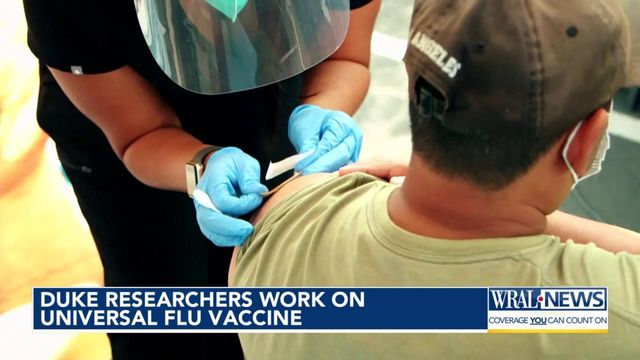Better than an annual flu shot? Duke researchers developing longer-lasting flu vaccine
One shot a year that targets the anticipated dominant strain of influenza. That’s the status quo for those looking to survive flu season.
But what if you could get one shot every few years that targeted all of the flu strains at once?
That’s the goal of Duke University scientists who are working on a universal flu vaccine.
“What we’ve done is just simply ask the question: Is it possible to make an antibody that would bind to all sorts of flus, not just the flu of the season,” said Garnett Kelsoe, an immunology professor at Duke University School of Medicine.
Kelsoe’s team, along with a group of researchers at Harvard University, have been working on the development of a universal flu vaccine for seven years.
Recently, the team discovered a group of antibodies in several unrelated humans that target all types of influenza. The antibodies were also found in some animals.
“It was quite rare actually,” Kelsoe said. “It was two antibodies out of about 8,000 that bound to all sorts of different kinds of flu — the flu that is circulating now, but also flu that has circulated in the past and kinds of flus that actually are only in animals.”
The discovery, published late last year in the Proceedings of the National Academy of Sciences, could mean unprecedented protection against a virus that infects millions and kills thousands of people each year.
According to the Centers for Disease Control and Prevention, the flu caused an estimated 31 million people to get sick and 21,000 deaths during the 2022-23 flu season. And on Wednesday, the North Carolina Department of Health and Human Services released data indicating that deaths related to the flu are on the rise in the state.
Annual flu shots require some guesswork by public health experts who predict the prevailing flu strain. A universal shot, the thinking goes, could offer more protection and possibly reduce the severity of the illness, and perhaps reduce deaths.
“The way that all human vaccines are developed right now is they’re developed for the strain that the World Health Organization basically bets is going to be the circulating strain the next year, so it’s always bet in advance. Sometimes they’re right, sometimes they’re not right,” said Kelsoe.
To get the vaccines manufactured and into pharmacies on-time, the prediction has to be made several months in advance which leads to an average annual flu vaccine efficiency of about 50%.
A universal flu vaccine is designed to be more of a “sure bet” by defending against a wider array of flu strains — not just those predicted by public health experts, Kelsoe said.
After the researchers discovered the antibodies, the team at Harvard used what’s called cyro electron microscopy to determine where the antibody attaches to the flu virus.
The researchers at Duke then introduced the antibodies to mice and injected them with the flu.
“You can give the mice hugely lethal doses of influenza virus, and the mice survive,” Kelsoe said. “In fact, they don’t really get sick at all.”
The recent rise in North Carolina flu deaths comes as the CDC says flu vaccinations are the lowest in the last five years.
If people could get just one shot that protected against all strains rather than just one, it could greatly combat vaccine hesitancy, Kelsoe says.
“If a shot is really good and it lasts for multiple years, you have great faith in that it’s terrific,” he said. “If you have to get a shot every year and it’s only about 50% effective, that reduces people’s faith. One of the goals of the universal vaccine is to regain people’s faith and the efficacy of vaccines.”
The team will now move forward with their findings to test in primates sometime over the next two years. If the vaccine proves to be effective in primates, then human trials could begin.
Kelsoe said it’s still important for people to get their annual flu shot while the universal vaccine is being developed.
“Even the vaccines that are not 100% effective reduce sickness and significantly reduce death. They’re very, very valuable.”











